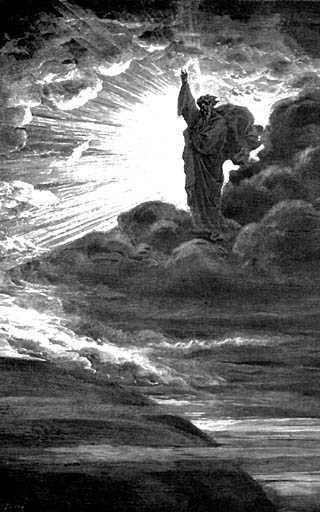| HPS 0410 |
Einstein for Everyone |
|
Back
to main course page
Philosophical Significance of the General Theory of Relativity
or
What does it all mean, again?
Cosmos and Infinity
John
D. Norton
Department of History and Philosophy of Science
University of Pittsburgh
Here are two further morals, both concerned with matters
on cosmic scales.
God and the Big Bang
The King James version of the bible begins in Genesis
with the following memorable account of the origin of the world:
 |
In
the beginning God created the heaven and the earth.
And the earth was without form and void, and darkness was upon the
face of the deep. And the Spirit of God moved upon the face of the
waters.
And God said, “Let there be light”; and there was light.
And God saw the light, that it was good; and God divided the light
from the darkness.
|
It is tempting to see in big bang cosmology a
vindication of this Genesis account of creation. For the big
bang, loosely speaking, has the universe issuing out of a conflagration of
great heat and energy. The match, of course, is imperfect. Genesis
supposes dark waters prior to the moment of light; and there is no early
water in big bang cosmology. Still, we might imagine some vindication
through these questions:
Question: Is Genesis' moment of the
creation of light the same as the moment of the big bang in big bang
cosmology? ("Let there be light.")
Question: The creation of the universe is a miraculous
breakdown of physical laws. Is this miraculous moment of creation the same
as the singular breakdown of physical laws in big bang cosmology at the
big bang?
These questions lead us into the tangled
relationship of science and religion. I do not wish to enter into the
broader issues they raise. My concern here, however, will be a very narrow
one. Can we find in the science itself a
positive answer to these two questions? That is, is there a moment in bang
bang cosmology at which light is created? Is there a miraculous breakdown
of physical laws at this moment?
The answer to both questions is no.
For the point made repeatedly in an earlier
chapter is that there is no moment of the big
bang. In big bang cosmology, for every moment in time, there is
always an earlier one, but there is no earliest, first moment. As the
chapter explains, this is quite compatible with our universe extending
only finitely many years into the past.

Nonetheless, it is tempting to
imagine God at some moment immediately prior to the moments of
time of big bang cosmology. At this moment of creation, God creates light.
The difficulty is that this tempting image is outside the science. For the
moment supposed is not a moment in spacetime. It is a moment, outside the
time of big bang cosmology. The cosmology can tell us nothing about
moments outside of itself, for the cosmology does not apply there. Big
bang cosmology provides no notion of "earlier" to make sense of how this
moment of creation can come before the moments of time of big bang
cosmology.
To posit a moment outside the moments of big bang
cosmology is to posit a moment outside of the spacetime of physics. One
does not need big bang cosmology to make such a posit. It can be made in
any cosmology, including those that extend for infinite times into the
past. In such a universe we could also imagine a moment of creation prior
to all the moments of the cosmology. The situation is the same in both big
bang and infinite past time cosmology: neither
supplies a notion of "earlier" that locates the moment of
creation.
We are often told that the big bang originates in a
singularity, which is portrayed as a place where the laws
of physics break down. Once again it is tempting to imagine this
is where God miraculously suspends the laws of physics to create the
world. Once again, we find no comfort for this idea in big bang cosmology.
For the cosmology itself provides no definite moment of time where a
singularity happens.
Talk of a singularity as existing in any positive sense is
an oversimplification that is usually benign. Here, however, it proves
misleading. Speaking more precisely, there is no
place where the laws of big bang cosmology break down. Rather the
very notion of a breakdown occurs within the scope of a reductio argument.
We posit such a candidate place in order to show that, according to big
bang cosmology, there is no such place. That is, we ask can there be a
first moment in big bang cosmology? We project back and find that such a
place would have properties that contradict the physical theory. For that
theory asserts that the curvature of spacetime is everywhere finite and
well-defined. At this first moment--if there were such a thing--the
curvature would be infinite and thus ill-defined. We complete the reductio
by concluding that there is no such place.
Completing An Infinity
One of the most intriguing results of metamathematics is
that there are certain computational tasks that cannot be completed as a
matter of principle, even though they appear quite achievable. One of the
simplest is the "halting problem." The task
is to write a computer program that can check the operation of other
programs. Call a computer running the program "CHECK." In operation, CHECK
is fed as input a candidate computer program of interest and some
nominated input to the program. CHECK would then tell us whether that
candidate program would come to a halt and return a result on that input;
or whether it would continue to compute indefinitely and return no result.
In more familiar language, will it "crash"?
The surprising and, it turns out, easily proved result is
that there can be no CHECK program. The halting problem is insoluble. This
is the most familiar of many further "uncomputable"
tasks.
What is the nature of this insolubility? It is easy to
imagine that it is a simple matter of logic. These tasks are uncomputable
in the same way that there is no whole number that is the square root of
ten. That is not so. The proofs of uncomputability all depend on what is
actually a physical statement:
It is impossible to complete a computation that requires
infinitely many steps.
Of course in the world of ordinary
experience, this is an impossibility. No one (I hope) is
expecting us to be able to build a computer that will complete an infinite
number of computational steps. It is easy to conflate that practical
impossibility with a logical impossibility. Here is an argument that tries
to make it a logical impossibility:
If a computation requires infinitely many steps, then it
cannot be completed, since there is no last step that would complete the
computation.
Plausible as this last argument seems, it
is a fallacy. To complete an computation with infinitely many
steps requires only that we do all the steps. If "do all" can be achieved,
then the computation is completed. There is nothing more to ask of it.
Adding the extra demand "... including the last one" is an unnecessary,
additional requirement that is the cause of the logical difficulty. It
supposes that there has to be a last step where there can be none by
supposition.
The impossibility of completing infinitely many steps in a
computation is not a logical restriction. It is a
physical restriction. If we could circumvent this physical
restriction and complete infinitely many actions in a finite time, then
traditionally uncomputable tasks would become soluble. For example, it is
possible to devise a computer that can implement any program. This is a
"universal Turing machine." It would solve the halting problem. We would
simply ask the machine to implement the operation of the chosen program on
the input of interest. We would then only need to observe the operation of
the machine to see if it halted on that input.
















https://commons.wikimedia.org/wiki/File:Gluehlampe_01_KMJ.png
| The literature on "supertasks"
explores the possibility of systems that complete an infinity of
actions in finite time. Needless to say, these systems are highly
idealized and fictional. The goal, however, is not to establish how
we could make such systems in practice. It is to show that the
completion of infinitely many actions is not a contradiction in
logic. |
Within this literature, general relativity provides us
with an intriguing scenario in which this completion becomes possible. For
it provides us with spacetimes in which the infinite
lifetime of one entity can be fully contained within the past
light cone of another.
In such a spacetime, the first entity is an idealized
calculator who is programmed to compute for an infinity of the
calculator's proper time. For example, the calculator may check Goldbach's
conjecture that every even number is the sum of two primes. The calculator
simply goes through the infinite list 2, 4, 6, 8, ... checking
each even number in turn. If a counterexample is found, the calculator
sends out a signal that will be received by the second entity, the
observer. The calculator will never know at any finite time in its life
whether a counterexample is found. However the observer will know if one
is found, since the observer can survey the entire, infinite life of the
calculator. This calculator-observer combination can now compute things
that are normally regarded as uncomputable.
This case is represented in the spacetime diagram below.
The calculator "C's" worldline has infinite length in proper time and is
fully contained within the past light cone shown. The observer O lies
outside that light cone, such that the entirety of
C's world line is within observer O's past light. As C checks
each even number, C sends a signal to O indicating the result. Since O
will receive all the signals in a finite time along O's world line, O will
know whether there is a counterexample to Goldbach's conjecture; or
whether it holds for all even numbers.

Of course this system of calculator and observer involves
some extreme idealizations. We assume a
calculator who can continue calculating for infinite time. We assume an
observer who can disentangle infinitely many signals arriving in finite
time. There will be other pathologies in the structure of a spacetime that
allows this arrangement in the first place. That we need such
idealizations impinges on the question of practical achievability. However
it does not compromise the main point: there is no logical impossibility
in completing an infinity of actions. Here we see a spacetime hospitable
to such completions.
For an account of these
spacetimes, see my paper with John Earman, "Forever
is a Day: Supertasks in Pitowsky and Malament-Hogarth Spacetimes," Philosophy
of Science, 60 (1993), pp. 22-42.
Copyright John D. Norton.
February 23, 2013. November 14, 2019. February 6, 2022.


